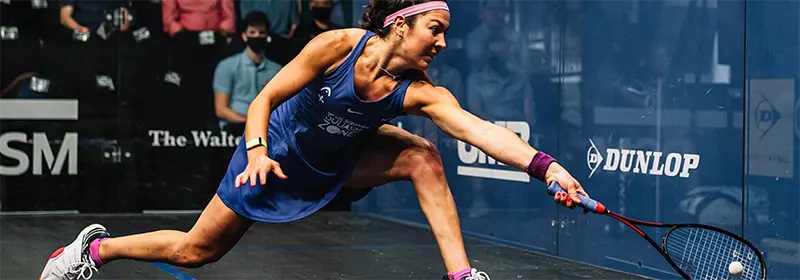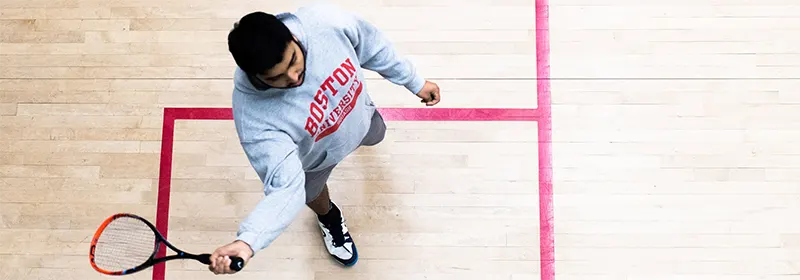05 October 2022 / 3-Min Read / Translate
Most of us want to improve, and I suppose that if you are reading this article, you do too. Over the years of coaching and helping people improve their squash, I found that there were a number of common elements in thew wide variety of players who did improve. Here are some of those elements, grouped around the idea of C.
This is no substitute for hard work. If you want to improve you have to accept the responsibility yourself and know that you’re going to have to put the time and the effort in, over a longer period of time. Nowadays, everybody wants that “quick fix”, that “secret tip”, that “short cut” that will save them time and effort, but honestly, when it comes to long-term improvement nothing beats hard work.
Sure, nobody wants to waste their time and finding efficient and effective training methods is valid response to today’s busy schedules, but with commitment any improvement will be short-term – like buying a new racket and playing better for a few weeks. In this context, hard work means committing to doing the things you NEED to do, not just the things you LIKE to do.
What exactly are those things? Well, probably fitness training, more solo drill time to improve your control and more conditioned games to improve your tactical play – but that’s where the responsibility comes in. You have to make those decisions about what to focus on. Just remember, quick fixes don’t last long and to really improve your game you will have to spend 6-weeks working hard to have a lasting benefit.
I recognise that unlike pros, who can dedicate all their time to improving, you probably have limited time available. All I am saying is use the time you have effectively.

You can't become a great squash player without commitment.
The ability to concentrate on the right things at the right time is key to playing great squash, or being good at anything really. Most club players lack the depth of concentration that better players have. Being able to ignore intrusive thoughts and feelings during matches is important, but also knowing what to concentrate on helps too. here are 4 things to concentrate on next time you get on court.
Watch the ball hit your strings. I keep saying this because I truly believe it’s one of the fundamentals of great squash. Keeping your head still at the moment of impact gives you better timing and balance, it also gives your opponent less information about where you are going to hit the ball.
Prepare the racket early. I’m not talking about having the racket high and in the middle of your body in that stereotypical stance, but simply making sure that your are ready to hit the ball in plenty of time. This point helps your swing, but by concentrating on it, you focus your mind and allow yourself the chance to hit shots you might not have been able to with late prep.
Hit every shot with clear intention. The better you know what you want to do with the ball, the more chance you have doing it. Simply thinking “I’m going to hit a straight drive” is very different from aiming to hit the ball at the service line to stay within 3 floorboards on the floor and bounce in the back of the service box. If you hit a great shot without a very clear goal, it was lucky!
Get back to the T ASAP. Believe it or not, pros get back to the T as fast as they can, but get to the ball as fast as they need to. It’s a subtle difference, but by getting back to the T as fast as possible, you allow yourself more options. Just don’t forget to do the split-step just before your opponent hits the ball! Remember: Hit and Move!
There are two types of consistency to talk briefly about here: consistency of training and consistency of shots.
Training. I've already mentioned that you need to commit to about 6 weeks of training. Anything less and any gains you make will be lost as easily. But you can't train hard for one week, then miss training for the next week etc. You need to create a schedule that is realistic for your life, but also allows you to work hard on your squash 3 or 4 times a week. That doesn't mean you have to get on court 3 times a week, but you have to do something that improves your squash.
Shots. I've seen plenty of club players who can hit some incredible shots every now and again. But that's not what wins matches. What we need is for our "normal" shots to be consistently good too. There's no point being able to hit amazing shots every tenth shot if the other nine are terrible. Many times you see two players who seem evenly matched, but over the course of a match one player is winning more points due to being able to consistently hit wide, deep, short or whatever is need, shots. This is where solo drills and conditioned games become so valuable. They allow you to develop that consistency, which can then be used in matches.

What goals has he set this season?
Ambitious people often set short, medium and long term goals. Thinking solely about long-term goals doesn't always help you do what you need to do on any particular day. By setting a challenge for yourself for smaller things allows you to forget about the top of the mountain and focus on the next step. Create your training schedule, but forget it. Focus on the challenge today, or this drill, or this training session.
Focus on the things that are immediately within your control. For example, "I am going to aim to hit a target (racket) on the floor when I do my solo straight drives." Having targets every time you solo drill or play conditioned games is a good example of a mini-challenge. Daily challenges should be attainable but not easy. if you do some fitness work, don't just go for a run, aim for a time - but again, make the time attainable, but not easy. Of course, sometimes, simply going for the run is enough of a challenge.
If nothing changes, nothing improves. If you a e the kind of player who tries to hit winners too early in a rally - CHANGE! Become more patient and wait for the right moment.
If you are the type of player who simply keeps hitting the ball back hoping for their opponent to make a mistake - CHANGE! learn how to pressure your opponent without giving them easy opportunities.
Introduce one new shot into your game this season. Perhaps a defensive lob, perhaps a better working boasts, more volleys etc etc. Something that when you have finished playing, your opponent says to you "Hey, you played differently today".
Perhaps the change is a technical aspect or perhaps it's a mental change, but without change there's no growth.
Concentrate on committing to consistency through daily challenges which allow you to change! Okay, that sentence was a little forced, but by using the 5 Cs above you will improve. Improvement rarely happens through luck. Even if you chose one C, that would be better than nothing.